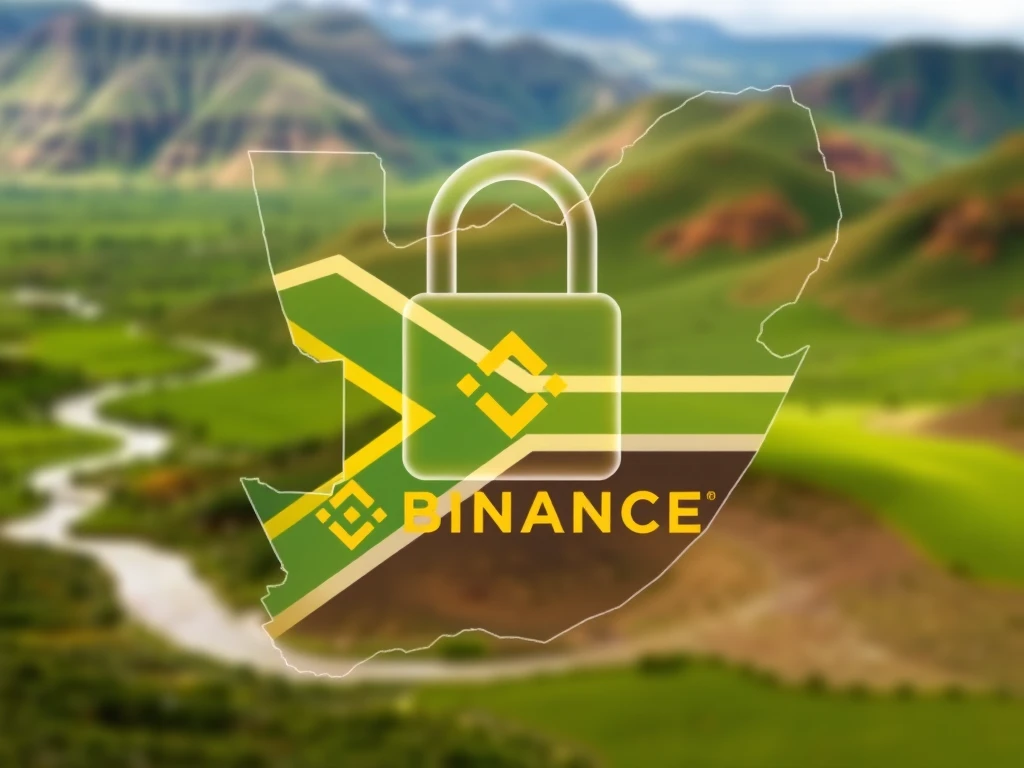Crucial Update: Binance South Africa Tightens Compliance for Crypto Transfers

Major changes are coming for users of Binance in South Africa. Starting April 30, the exchange will implement stricter compliance measures specifically targeting crypto deposits and withdrawals. This move is a direct response to evolving crypto regulation South Africa is putting in place, impacting how users conduct Binance crypto transfers.
Understanding the New Binance South Africa Compliance Rules
Binance, a leading global cryptocurrency exchange, announced on April 23 that South African users will need to provide additional information for crypto transactions. This step aims to align the platform with local regulatory requirements.
Here’s what users need to know:
- Effective Date: The new rules take effect on April 30.
- Affected Transactions: The requirements apply to both crypto deposits and withdrawals.
- Required Information for Deposits: Users must provide the sender’s full name, country of residence, and the name of the originating crypto exchange (if applicable).
- Required Information for Withdrawals: Users must provide the beneficiary’s details before the transaction can be processed.
It’s important to note that these changes primarily impact the transfer of crypto in and out of the platform. Trading and other features on Binance are not affected by this specific update.
Why the Change? Addressing Crypto Regulation South Africa
Binance stated that the implementation of these new measures is in response to regulatory demands within South Africa. The country has been actively working to increase oversight of its rapidly growing crypto sector.
Recent developments highlight this push:
- In early April, South Africa’s Revenue Service (SARS) urged individuals and entities involved in crypto transactions, including exchanges and intermediaries, to register with the authority. SARS warned that failure to register is now considered illegal.
- In March, the Financial Sector Conduct Authority (FSCA) issued warnings against unlicensed crypto firms, indicating increased scrutiny on market participants.
These actions underscore the government’s commitment to establishing a clearer and more regulated environment for digital assets.
Implications of the New Binance Crypto Transfers Policy
Binance has advised users that failing to provide the required sender and receiver details could lead to delays in transactions. In some instances, funds might be returned to the sender if the necessary information is incomplete or missing.
To prepare for the rollout of these rules, Binance required users to re-login to their accounts starting April 24. This step likely ensures users are prompted with the updated terms and requirements.
The Broader South Africa Crypto Market Context
Despite increased regulation, South Africa is positioning itself as a significant player in the African digital asset space. Experts suggest the country’s existing legal framework and business environment make it an attractive entry point for crypto expansion across the continent.
Market projections indicate continued growth for the South Africa crypto market. Revenue is expected to reach significant figures in the coming years, driven by increasing adoption and regulatory clarity.
Regulatory momentum is also evident in the number of licenses being issued. In March 2024, the FSCA approved 59 crypto platform licenses, with many more applications still under review. This suggests a move towards formalizing the sector rather than stifling it entirely.
While Binance did not provide further comment when contacted, the exchange’s decision reflects the global trend of platforms adapting to local regulatory landscapes to ensure continued operation and user safety.
Summary: Adapting to Enhanced Compliance
The new compliance rules from Binance for South African users mark a significant step in aligning with the country’s increasing focus on crypto regulation. By requiring detailed information for Binance crypto transfers, the exchange aims to enhance transparency and meet local demands. While this might introduce extra steps for users, it reflects the maturing regulatory environment in the South Africa crypto market. Users should ensure they are prepared to provide the necessary details to avoid transaction issues starting April 30.








